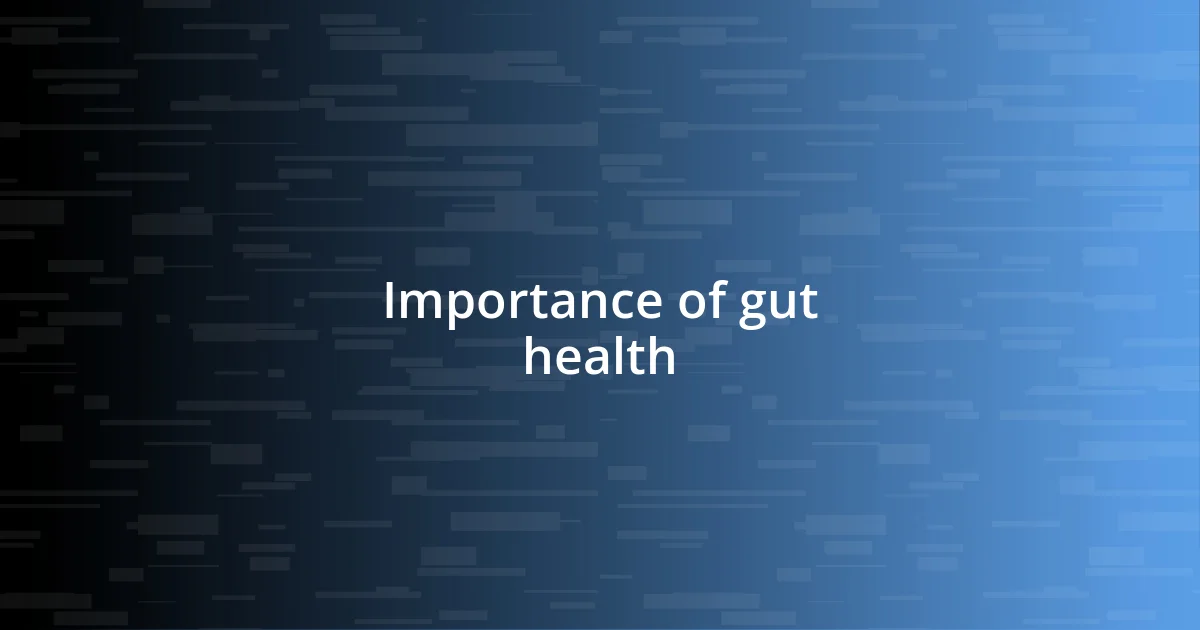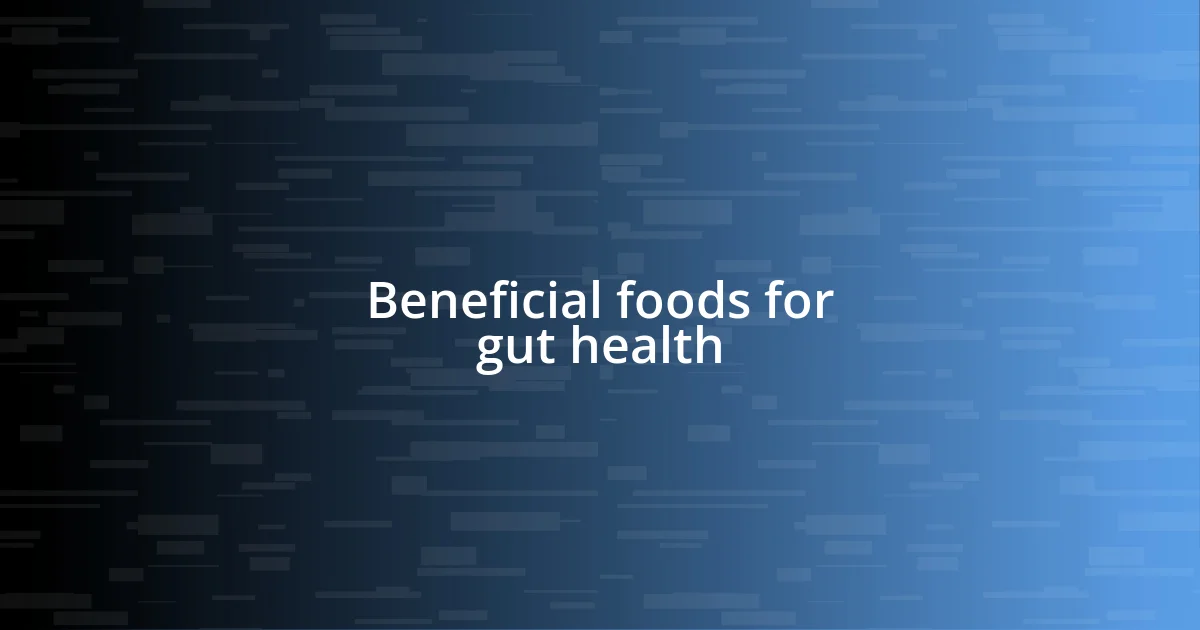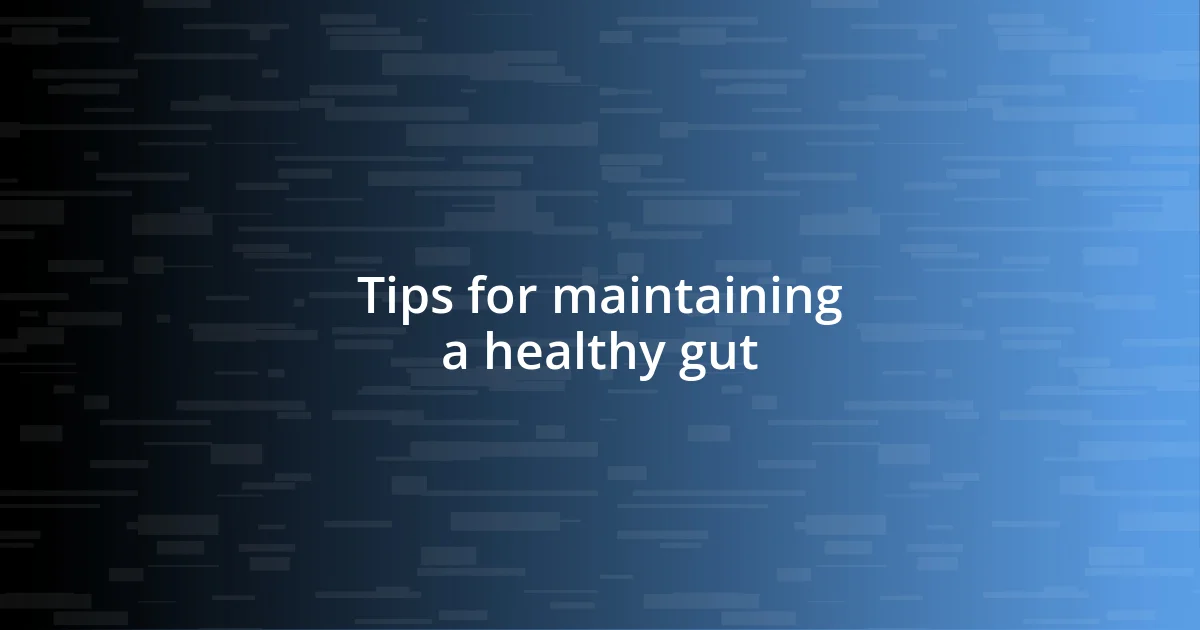Key takeaways:
- Gut health significantly impacts digestion, immune function, mental health, and chronic disease prevention.
- A balanced diet rich in fiber, probiotics, and prebiotics can enhance gut microbiome health and overall vitality.
- Lifestyle changes like regular physical activity, mindful eating, and stress reduction are crucial for maintaining a healthy gut.

Understanding gut health basics
Gut health is a fascinating topic, and it all starts with our gut microbiome—the trillions of bacteria living in our digestive system. You might be surprised to learn that these tiny organisms influence everything from our mood to our immune system. I remember the first time I connected the dots between my digestive discomfort and stress; it was an eye-opener for me. Have you ever experienced that uneasy feeling in your stomach when you’re anxious?
The key players here are probiotics and prebiotics. Probiotics are the friendly bacteria you can find in foods like yogurt, while prebiotics are the fibers that feed these beneficial microbes, often found in fruits and vegetables. When I began incorporating more fiber into my diet, I noticed a significant improvement in my overall well-being. Have you ever thought about how your diet might be impacting those little friends in your gut?
It’s crucial to understand that a balanced gut can improve not just your digestion but also your mental health and energy levels. Sometimes I stop and consider how a simple change in my diet could spark such vast changes in my mood. This interconnectedness surprised me, and it surely carries implications for how we treat gut health moving forward. What little adjustments could you make today to nurture your gut?

Importance of gut health
Maintaining gut health is essential for overall wellness, influencing not just physical but mental well-being as well. I often reflect on my own experiences, like the times I’ve felt sluggish and irritable after indulging in processed foods. It’s like a fog settles in, reminding me just how interconnected our gut and brain truly are. This interplay makes it clear that prioritizing gut health shouldn’t be overlooked; instead, it deserves our attention.
Here are some key reasons why gut health is important:
– Digestion: A healthy gut aids in breaking down food, allowing for better nutrient absorption.
– Immune System: A balanced gut microbiome plays a critical role in protecting against infections and inflammation.
– Mental Health: Gut health can significantly influence mood and stress levels, illustrating the gut-brain connection.
– Weight Management: An optimal gut environment can help regulate metabolism, impacting weight in a positive manner.
– Chronic Diseases: Poor gut health has been linked to various chronic conditions, such as diabetes and heart disease.
By nurturing our gut health, we are not just improving our digestion; we’re investing in our overall vitality and quality of life. As I prioritize foods that promote a healthy microbiome, I feel empowered knowing that small, deliberate choices make a big impact.

Common gut health issues
Common gut health issues can manifest in various forms, and recognizing them is the first step toward improvement. One of the most prevalent issues is irritable bowel syndrome (IBS). I remember when I first experienced the discomfort of bloating and cramping. It was frustrating and confusing, and I wished I understood what triggered those symptoms. Then there’s the concern of dysbiosis, which refers to an imbalance in the gut microbiome. It’s astonishing how a few lifestyle choices can disrupt that balance, leading to digestive distress and, in some cases, an increase in harmful bacteria.
Another common issue I’ve encountered is food intolerances. For me, discovering that dairy didn’t sit well with me was eye-opening. I realized that these intolerances can vary widely from person to person, and they require a unique approach. Learning to identify my triggers has empowered me to make better dietary choices that support my gut health. Have you ever noticed any foods that just don’t agree with you?
Lastly, chronic inflammation in the gut can lead to more severe conditions, such as Crohn’s disease or ulcerative colitis. Watching how stress affected my gut, I often pondered how managing that stress could help prevent inflammation. My journey has taught me that paying attention to my body’s signals is crucial in maintaining a healthy gut environment. By being proactive, we can manage these common issues and enhance our overall health.
| Gut Health Issue | Description |
|---|---|
| Irritable Bowel Syndrome (IBS) | A common disorder causing abdominal pain, cramping, and changes in bowel habits. |
| Dysbiosis | An imbalance in gut bacteria, leading to digestive issues and inflammation. |
| Food Intolerances | Reactions to specific foods that cause discomfort, such as bloating and cramping. |
| Chronic Inflammation | Long-term inflammation in the gut that can lead to serious conditions like Crohn’s disease. |

Nutrition’s role in gut health
Nutrition plays a pivotal role in shaping our gut health, and I’ve experienced firsthand the profound effects of what I eat. For instance, when I started incorporating more fiber-rich foods, like fruits and whole grains, into my diet, I noticed a tangible improvement in my digestion. Have you ever felt that satisfying fullness after a big salad? It’s amazing how fiber not only keeps things moving in our gut but also feeds the good bacteria that thrive there.
Moreover, I’ve become increasingly aware of the impact of probiotics and fermented foods. When I added yogurt and sauerkraut to my daily routine, I felt a noticeable shift in my overall well-being. I didn’t just stop at feeling better after meals; there was an energy boost that was hard to ignore. It’s like my gut was thanking me for nurturing it! Research continually shows that these beneficial bacteria can enhance immune function and support mental health.
Then there’s the importance of hydration. I often find that on days when I don’t drink enough water, my gut feels sluggish and grumpy, almost like it’s throwing a little tantrum. Staying hydrated helps everything move smoothly. Have you ever noticed how a simple glass of water can make a world of difference after a heavy meal? It’s these little adjustments in nutrition that have transformed my gut health journey, and I’m excited to share that knowledge with others.

Beneficial foods for gut health
Beneficial foods for gut health are truly transformative, and I’ve come to appreciate how some simple additions can make a huge difference. For instance, incorporating foods rich in prebiotics—like bananas, asparagus, and garlic—has not only satisfied my cravings but also supported the growth of friendly gut bacteria. I remember the first time I tried making a garlic-infused dish; I could almost feel my gut thanking me for the tasty boost!
Probiotics have played a key role in my gut health journey. Since I began enjoying kombucha regularly, I’ve noticed not just a difference in digestion, but also an uplifting sensation of overall vitality. It’s fascinating how one fizzy drink each day can elevate my mood and well-being. Have you ever thought about the joy that bubbles and flavors can bring while simultaneously nurturing your gut?
I also can’t overlook the power of leafy greens. In salads, smoothies, or even as a side dish, spinach and kale have become staples in my diet. I recall a particularly busy week when I committed to a daily smoothie loaded with these greens. Not only did my energy levels soar, but my digestion remained remarkably smooth. Have you explored the versatility of greens in your meals? They’re such an easy way to enhance not just gut health, but overall nourishment too.

Lifestyle changes for gut health
Making certain lifestyle changes can significantly enhance gut health, something I’ve come to understand through both trial and error. For example, I started prioritizing regular physical activity after realizing how much it positively affected my digestion. Have you ever noticed that feeling of lightness after a brisk walk? It’s remarkable how movement encourages gut motility and keeps everything running smoothly.
Mindful eating has also transformed my relationship with food. I once rushed through meals, barely tasting what I was eating. But now, taking the time to savor each bite not only brings me joy but also helps my digestion. Just the other day, I indulged in a slow, leisurely dinner, appreciating the flavors and textures of each dish. It’s amazing how this simple shift can foster a higher awareness of how food makes me feel—both mentally and physically.
Lastly, reducing stress has been a game-changer for my gut health. I remember a particularly stressful period at work when my stomach felt like a tempest. Finding ways to relax, like practicing yoga or meditating, has truly calmed that storm. I ask myself, how often do we overlook our emotional well-being’s impact on our physical health? It turns out that nurturing my mind helps keep my gut in check, creating a harmony I hadn’t previously valued.

Tips for maintaining a healthy gut
One of the most effective tips I’ve stumbled upon is staying hydrated. I never used to drink enough water, but since I started carrying a water bottle everywhere, my digestion has improved significantly. Have you ever noticed how just a few extra sips throughout the day can make you feel more energized? It’s a small habit that can lead to big changes in gut health.
Another impactful strategy I’ve adopted is incorporating fermented foods into my diet. I started with yogurt, and then I ventured into kimchi and sauerkraut. The first time I tried homemade kimchi, it felt like a flavor explosion! I couldn’t help but smile thinking of all those beneficial bacteria joining the party in my gut. Have you tried any fermented foods? They’re not just tasty; they also provide a natural source of probiotics that my body has come to love.
Don’t underestimate the power of balance. I’ve realized that allowing myself the occasional indulgence, like a slice of cake or a glass of wine, doesn’t derail my progress. Instead, it fosters a healthier relationship with food. I remember a weekend getaway where I savored a few extra treats, guilt-free. It taught me that enjoying life while being mindful of my choices can co-exist harmoniously. What about you—how do you find balance in your diet?













